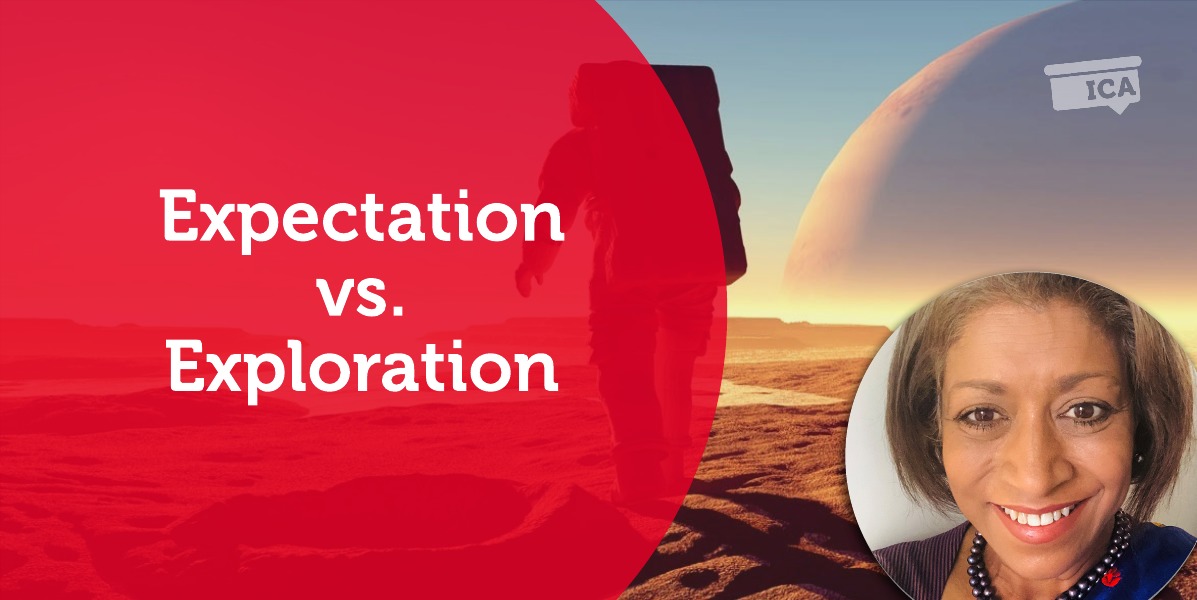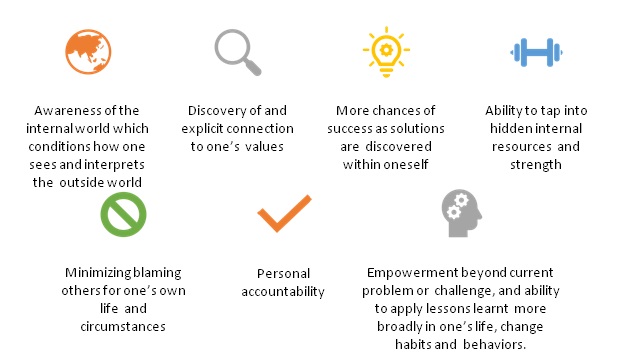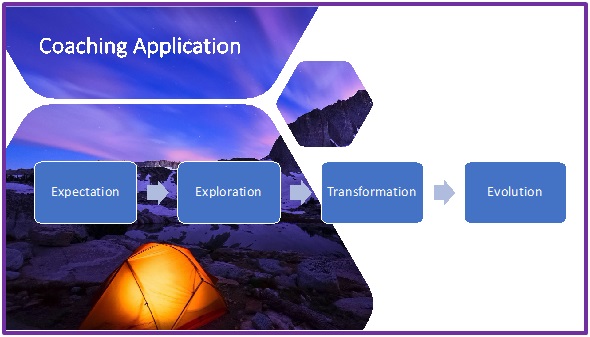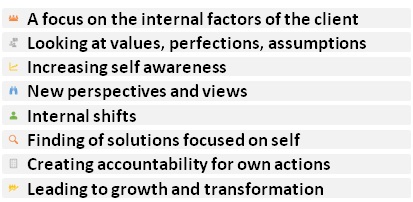 A Coaching Power Tool Created by Gaya Gamhewage
A Coaching Power Tool Created by Gaya Gamhewage
(Executive Coach, SWITZERLAND)
 Introduction
Introduction
My journey with ICA has brought me far. It has given me new insight into the hearts and minds of other people and provided me with new tools to examine my own mind more skillfully. As a medical doctor and public health expert, I am constantly exposed to the suffering of others, and the ICA journey equipped me with new skills to help others on a deeper transformational level.
But despite fast progress over a short period of time, something told me to take my time with the Power Tool. I wanted to savor the learnings and let the experience of coaching settle in in my mind. I already had many tools, so what would be my power tool? What one perspective or concept could take my coaching to the level I aspired to? I know it had to be truly powerful and transformative and had to have deep meaning for me. I practiced coaching, with peers, with clients, with colleagues, paid, and for free, to gather enough experience and diversity. Through this practice, one observation emerged frequently and clearly and I found my core concept.
An accident of history, we are now living through an unprecedented crisis on our planet. Intensifying my coaching work during this period of lockdown, I was able to experience how the COVID-19 pandemic impacted people. No matter whether clients lived in countries that are at peace or in crisis, whether they were family members, colleagues, or acquaintances at large. Similar questions were constantly present.
This power tool is the result of my lived experience based on the framework of coaching I learned at ICA. It resounds profoundly with me as it draws on my own spiritual journey to achieve my own potential and to serve others.
Explanation
-
Expectation
Your expectations are your strong hopes or beliefs that something will happen or that you will get something that you want[i]. A person’s expectations are strong beliefs they have about the proper way someone should behave or something should happen.
Subjective to the person experiencing it, the expectation may or may not be based on reality. Expectations can be based on our observation of the world (the sun will rise tomorrow, good begets good); on social norms (e.g.: he should not shout at me; she should not leave work early, they should go to church); or on personal values and beliefs (I worked hard and should be promoted, he should appreciate me more).
We need expectations to navigate life. Expectations can guide us and create a shared understanding of what we want from ourselves and what we expect from others. These allow us to make decisions, take action quickly, and without a lot of thought. But they can also lead to frustration, anxiety, suffering, grief, and many more negative emotional states. The line between a “reasonable expectation” and a “false expectation” is hard to draw and is often subjective.
Expectations are determined by a combination of experience, cognitive processes, communication with others, and cultural norms[ii]. For example, you are less likely to expect a pay-rise if you have recently been disciplined at work, than when your boss constantly expresses how satisfied she is with your work. But expectations serve as hypotheses about the future and can be false. While people with mental health problems can have fear-based expectations that are not based in reality, many functional people (and coaching clients) have false expectations too.
For decades, research has shown that our perception of the world is influenced by our expectations. These expectations also called “prior beliefs,” help us make sense of what we are perceiving in the present, based on similar past experiences. So, for example, if you have a prior belief that someone does not like you, you are more likely to expect them to behave negatively towards you and to perceive their actions negatively even if no one else interprets the situation in the same way as you do. This is sometimes called a self-fulfilling prophecy.
In coaching, clients often identify problems that are directly linked to their expectations of the world around them or of themselves.
All these issues are based on expectations one has for oneself and others one is interacting with. Some of these expectations are founded on reality and are reasonable. Others can be completely subjective, divorced from reality, and completely out of the control of the person. This gap between what is desired or expected and what is real provides a real opportunity for growth and development.
However, merely expecting something or some desired state does not automatically mean the expectation will be achieved. Listening to someone talking out their frustrations at unmet expectations will provide some relief – if only the fact that someone else cared enough to listen. But to focus on ONLY the expectations (failed or otherwise), which clients present is unlikely to be helpful in the long term.
Expectations create a mindset that drives emotions, and it is often in the form of these emotions that they are “presented” to coaches, friends, and priests to alleviate the speakers’ unhappiness and suffering. In coaching parlance, this is the story of the client.
To summarize, a focus primarily on expectations creates

-
Exploration
Exploration is generally defined as the activity of searching and finding out about something[iii], but here it refers to the exploration of one’s own mind and ones’ situation. Throughout human history, there have been many attempts to better understand our own minds and how we relate to the world we live in.
Self-exploration[iv]-according to the Merriam-Webster Thesaurus- is, since it was first used in the English language in 1954, defined as the examination and analysis of one’s own unrealized spiritual or intellectual capacities. But, I would argue that this concept goes back much further. Interestingly, schools of philosophy on self-exploration and self-examination arose in the West and the East around the same time, namely more than 26 centuries ago.
In the West, Socrates (c. 470 – 399 BC) the classical Greek (Athenian) philosopher credited as one of the founders of Western philosophy, and as being the first moral philosopher of the Western ethical tradition of thought, believed that[v] philosophy – the love of wisdom – was the most important pursuit above all else. His ‘examination’ of life in this way spilled out into the lives of others so that they began their own ‘examination’ of life. The message was clear: everyone dies one day, yet life without philosophy – an ‘unexamined’ life – was not worth living.
A century or so earlier, In the East, the Gautama Buddha (560–480 BCE) focussed on understanding the mind as the only way to “awaken”.
Whatever one frequently thinks and ponders upon, that will become the inclination of his mind[1]. (The Buddha, 6th Century BCE).
As a student and practitioner of Buddhism, I am struck by the relentless focus on the mind as the ultimate personal development plan described by the Buddha. Buddhist teachings position the exploration of the mind as the only direct path to happiness and liberation and firmly place responsibility on the individual for achieving one’s own happiness.
While there was some sharing of Buddhist ideas to the west in Greek and Roman times, Buddhism was introduced to the West in the 19thcentury, at a time when Christianity was being challenged by critical Biblical scholarship and Darwinism. Since then, Buddhist teaching, thinking, and practices have found a growing following in the West as a non-secular approach to self-development through exploration of one’s mind and environment.
Modern psychology, together with other fields such as physiology, neuroscience, sociology, anthropology, and philosophy, has provided tools and concepts for us to explore our minds and to address fundamental problems of unhappiness, unease, and frustrations.
Your visions will become clear only when you can look into your own heart. Who looks outside, dreams; who looks inside, awakes.– Carl Jung[1]
To summarize, using exploration as a frame creates and enables the following:

Application
 This power tool has the potential to support personal development helping the client to undertake transformative steps(which may be of a temporary nature) on their journey to reaching their highest potential. Sustained application of the mindset of exploration that increasingly replaces a mindset of expectation, can lead to evolution, which is a permanent change of the person over time. Because of the inspiration that led to its creation, I believe this power tool will be particularly useful for those involved in coaching for personal development, leadership development, and spiritual development.
This power tool has the potential to support personal development helping the client to undertake transformative steps(which may be of a temporary nature) on their journey to reaching their highest potential. Sustained application of the mindset of exploration that increasingly replaces a mindset of expectation, can lead to evolution, which is a permanent change of the person over time. Because of the inspiration that led to its creation, I believe this power tool will be particularly useful for those involved in coaching for personal development, leadership development, and spiritual development.
-
Helping clients
Coaching is about helping people become their best selves and is based on an appreciation that the client is whole and resourceful. Sometimes coaching can be limited to a transactional exchange, particularly in a context where the session revolves around a problem related to an unfulfilled expectation (the story). But focussing on the client rather than their story requires exploration of their own mind and environment by the client to enable growth (transformative coaching).
The “from expectation to exploration” power tool helps clients to shift the mindset from (unaddressed) expectations to (self) exploration leading to the following:

-
Helping coaches
But that’s not all. This power tool can help coaches become better coaches. With the shift from expectations to exploration, coaches can become truly open-minded and open-hearted; increasing their presence, empathy, and mindfulness competencies. They can become less and less judgemental and address their own conscious and unconscious biases that are inherent to all humans. Most importantly, it is important to note that the “problem” clients present are often not the real issue. This tool helps in many ways to help the client shift to an exploration of the real issues underlying the consciously perceived problem. A fuller list of coaching skills that can benefit from this power tool is depicted below.
Reflection
A power tool is still just a tool. The “power” in any power tool comes when applied with a full understanding of its functions and the results it can bring. There is subjectivity in how we perceive the power of any tool. For me, this power tool has deep meaning because it resonates with the way I see the world, my spiritual beliefs, and my own education and culture. To see if it has any power or utility for you, I invite you to reflect, including on the following questions.
Questions to help you reflect on this power tool as a coach
- How do you experience the impact of expectations in your own life?
- How do expectations serve you?
- How do expectations hinder your path to self-development?
- How do you experience self-exploration?
- How will you celebrate the mind shift from expectations to exploration in your daily life?
Questions to help you support your clients with this Power Tool
- How do the starter issues that your clients bring relate to unfulfilled expectations?
- How will you support clients to explore the role of expectations in their presenting (starter) problem?
- How can you support clients to shift to a mindset to explore their minds and environments?
- What other tools are available to you help shift focus to an exploration mindset?
- How can you help clients build longer-term competencies to use exploration as a default when reflecting on their lives and challenges?
References
[i]https://www.collinsdictionary.com/us/dictionary/english/expectation
[ii]Cherry, K. (n.d.). What is expectation confirmation? About.com Psychology. Retrieved from http://psychology.about.com/od/eindex/g/expectconfirm.htm
Meinecke, C. (2011, June 29). Are lowered expectations the key to happiness? Psychology Today. Retrieved from http://www.psychologytoday.com/blog/everybody-marries-the-wrong-person/201106/are-lowered-expectations-the-key-happiness
[iii]https://dictionary.cambridge.org/dictionary/english/exploration
[iv]https://www.merriam-webster.com/dictionary/self-exploration
[v]J. O. Famakinwa – IS THE UNEXAMINED LIFE WORTH LIVING OR NOT? Think / Volume 11 / Issue 31 / Summer 2012, pp 97–103 The Royal Institute of Philosophy 2012
M. Ambury – Socrates (469—399 B.C.E.) -2biii – The Unexamined Life in the Internet Encyclopedia of Philosophy